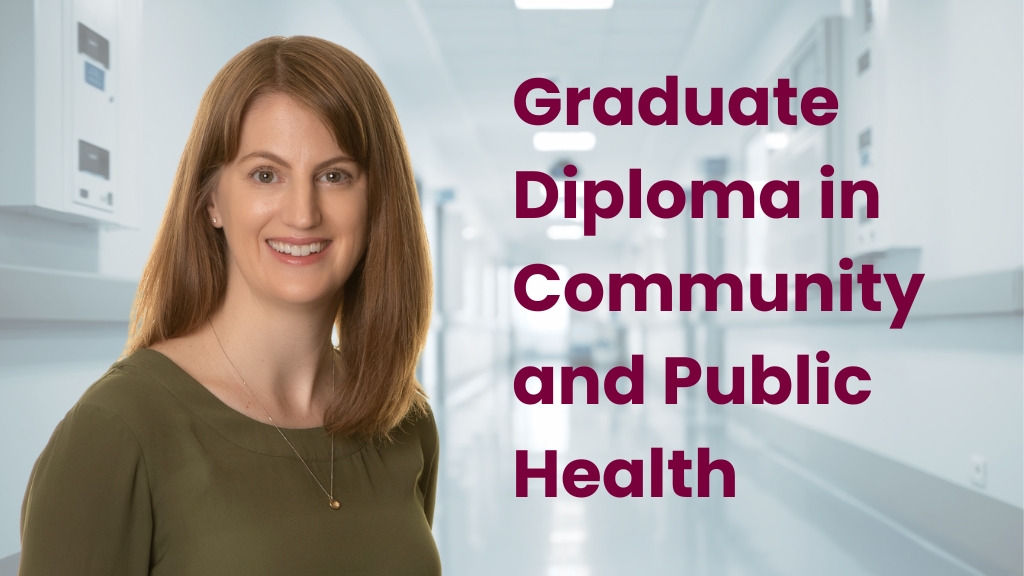Training the next generation of health professionals: Graduate Diploma in Community and Public Health (GDCPH)

McMaster’s Department of Health Research Methods, Evidence, and Impact (HEI) is home to seven graduate programs including master’s degrees, doctoral degrees, and diplomas that all contribute to training the next generation of health researchers and professionals. In the series “Training the next generation of health professionals,” we’re highlighting each of our programs and all they have to offer.
The Graduate Diploma in Community and Public Health (GDCPH) is dedicated to educating and empowering tomorrow’s public health leaders, advocates, and practitioners. Designed with flexibility in mind, the Graduate Diploma in Community and Public Health is delivered exclusively online, providing emerging or established professionals with the knowledge, skills, and expansive network they need to forge a rewarding career in community and public health.
“The GDCPH program not only allows me to learn from highly experienced public health professionals but also promotes weekly discussions with classmates, enabling me to develop important communication skills essential for my future career in healthcare,” described Harrison Phan, a current GDCPH student.
Laura Anderson, HEI Associate Professor, is the Director of the GDCPH program. We spoke with Anderson about her vision for the program, its impact on the community and public health landscape, and the opportunities it provides for students to make a meaningful difference in their careers.
What inspired the creation of the Graduate Diploma in Community and Public Health (GDCPH) program?
The COVID-19 pandemic and other recent public health emergencies highlighted the need for a strong public health workforce in Canada and the need for an expanded knowledge of public health by workers in many job sectors. We now recognize that not everyone has access to the same resources or the same public health needs, and the goal of community health is to work at the local level to address these inequities. Strengthening the health of the population starts at the community level. This was emphasized in the Chief Public Health Officer’s Report on the State of Public Health in Canada.
How does the GDCPH program contribute to addressing current challenges in community and public health?
The overall aim of public health is to prevent disease, promote health, and respond to emerging health threats. Students in the GDCPH program develop subject matter and methods expertise to inform evidence-based decision-making and address health inequities. Throughout the duration of the program, students will engage in authentic experiential learning and learn to address real-world public health challenges.
Can you elaborate on the unique features of the GDCPH program that differentiate it from other graduate programs in the field?
The GDCPH program is delivered exclusively online and in a part-time format that requires about 15 hours per week. One hour per week of synchronous activity is required where students have the opportunity to interact in small groups with faculty leads. Students learn from faculty and public health leaders currently working in municipal, provincial, and federal public health agencies, and through experiential learning opportunities they collaborate with other agencies and not-for-profits to address public health priorities.
Could you share some insights into the curriculum and learning outcomes of the GDCPH program?
The GDCPH program equips students with high-demand skills, informed by consultations with public health leaders across Canada. Its curriculum and learning outcomes were developed with consideration of the Core Competencies for Public Health in Canada, covering essential topics in public health foundations and policy, epidemiology and research methods, knowledge translation, and planning and evaluation for community and public health. Through four courses delivered over a 16-month period, students will be well-prepared for the expanding public health workforce and diverse related roles that support community and population health.
How does the GDCPH program foster a sense of community and collaboration among students and faculty members?
The GDCPH program not only teaches about the importance of addressing health inequities and promoting health for equity-deserving populations, but its instructors and the department also strive to create an inclusive environment that is supportive of diverse learners, including those from historically under-represented populations. Faculty and staff in the GDCPH are readily available to support students and additional resources are available through many offices at McMaster, including the Student Wellness Centre, Student Accessibility Services, Equity and Inclusion Office, and Career Services. GDCPH students have access to all of the resources available to other graduate students at the university.
For any questions or further information, don’t hesitate to reach out to the GDCPH team at gdcph@mcmaster.ca.
Programs